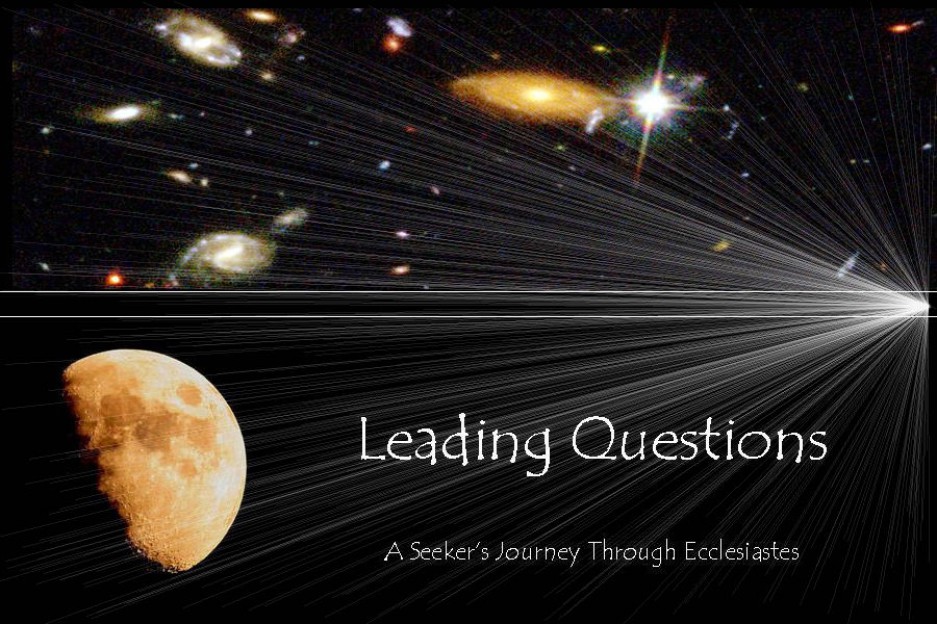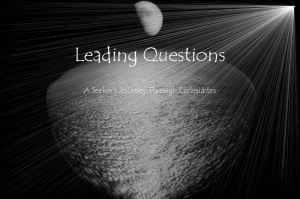Day One: Words Matter
“The words of the Preacher, the son of David, king in Jerusalem.” – Ecclesiastes 1:1 ESV
Our journey begins through Ecclesiastes. And, in the first few words we are given some clues to the writer of the book.
Or, are we?
A quick review of the major translations shows some disagreement in the designation of the speaker of the words in Ecclesiastes. The ESV translation, based on the Hebrew word qoheleth, pops up in the translation noted above as “Preacher.”
The NIV translation, based on the same Hebrew text refers to the speaker as “Teacher.”
The KJV uses “Preacher” as does the NASB while the NLT uses “Teacher.” The Good News version throws us another designation: “Philosopher.”
Preacher…Teacher…Philosopher: does it really matter?
Because we are relying on a translation into English, let’s see how the two most utilized descriptive words are defined, Preacher and Teacher, in Merriam-Webster’s English Dictionary:
Preacher – to make a speech about religion in a church or other public place : to deliver a sermon: to write or speak about (something) in an approving way : to say that (something) is good or necessary: to write or speak in an annoying way about the right way to behave.
And the full definition “to preach”: to deliver a sermon; to urge acceptance or abandonment of an idea or course of action; specifically : to exhort in an officious or tiresome manner
transitive verb
1: to set forth in a sermon <preach the gospel>
2: to advocate earnestly <preached revolution>
3: to deliver (as a sermon) publicly
4: to bring, put, or affect by preaching <preached the … church out of debt — American Guide Series: Virginia>
Teacher – “: a person or thing that teaches something; especially : a person whose job is to teach students about certain subjects” And the full definition:
1: one that teaches; especially : one whose occupation is to instruct
2: a Mormon ranking above a deacon in the Aaronic priesthood
A teacher “teaches” defined as:: to cause or help (someone) to learn about a subject by giving lessons: to give lessons about (a particular subject) to a person or group
1: to cause or help (a person or animal) to learn how to do something by giving lessons, showing how it is done, etc
a : to cause to know something <taught them a trade>
b : to cause to know how teaching me to drive>
c : to accustom to some action or attitude <teach students to think for themselves>
d : to cause to know the disagreeable consequences of some action <I’ll teach you to come home late>
2: to guide the studies of
3: to impart the knowledge of <teach algebra>
4a : to instruct by precept, example, or experience 4b : to make known and accepted teaches us our limitations>
5: to conduct instruction regularly in <teach school>
While there are parallels between what a Teacher and a Preacher may do, there are differences. The concept of a Preacher easily “fits” the mold of a sermon–a religious oration designed to lead people to a specific conclusion. Matthew Henry, author of one of the most utilized Bible commentaries clearly connects the idea of Preacher to a sermon and a man: Solomon. Mr. Henry’s belief points toward an older and repentant Solomon writing about his life in the narrative of a sermon to guide others to God–something Mr. Henry asserts Solomon had slipped away from but was now returning, “recovered from his backslidings.”
But, closer inspection of the word qoheleth appears to point toward a different designation, that of a Convener or Collector. Those words point in other directions, especially when we consider who this Preacher, Teacher, Convener, Collector may be.
Within a few words we learn a lesson: words matter. Translations have their own biases, prejudices and even intentions and purposes. Following one translation without considering the original language, context and even time of the writing will lead a reader to where the translators choose to take them.
Reliance on any of these designations takes the reader down paths that seem to “fit” various interpretations. Preacher works well to make the meaningless discussions sensible if God is the answer–a sermon to point toward the only way for life to have meaning. Teacher works somewhat in the same way, but changes the authority and specific intentions of what a “Preacher” offers in a sermon. A “convener” and, even more so, “collector” points toward a very different type and even time of the writing and offering of Ecclesiastes to an audience of hearers/readers.
To avoid this immediate impasse and avoid taking a path that may swerve us from what Ecclesiastes is saying, the designation that comes to mind for me is “Speaker.”
Whatever is being said is being said, spoken by a person/writer(s)…a basic foundation for something we can agree on to move forward without limiting our journey through Ecclesiastes in the first verse…agree?
But, who is the “Speaker” of Ecclesiastes? There are definitely clues, right? In the first verse the speaker is noted as “son of David, King in Jerusalem.”
The bandwagon of Bible scholars, while saying Ecclesiastes is written anonymously, point toward the likely speaker as Solomon, the son of David and the subsequent king of Jerusalem (following David) as chronicled in the Bible.
Again, the problem is the phrase “son of David” can apply to a descendant (ex: Jesus and Joseph in the New Testament)–many generations removed–or even a person simply following in the person’s footsteps. Focusing on reading Ecclesiastes as a penitent sermon of Solomon is limiting and a path potentially proving immediately flawed after only a few words.
To make the concept of Solomon as the speaker also brings into question the lack of solid proof of the type of rich and abundant kingdom the Bible depicts for a king in Jerusalem in the tenth century B.C. during Solomon’s reign. Minimal proof is evident of the existence of a “House of David” and only a stretch in archaeology to the architecture of Solomon’s building programs hints at the existence of a centralized ruling authority in the region in the tenth century. Pinning the assumed inspired words of Yahweh on an unnamed writer is more than presumptive–it may even be reckless in seeking the wisdom and intention of Ecclesiastes.
If God inspired the writing of Ecclesiastes (one of our base assumptions) the fact God did not choose to name the specific speaker/writer may be a divine reminder to not get hung-up on the writer(s), but what is being said. At a minimum, it speaks to the reality of anonymity–something almost all of the writings in the Bible share.
Instead of tying ourselves down to any one interpretation and path, how about let’s agree to not agree with a specific interpretation offered in the vast number of commentaries and move forward, simply listening to what this “Speaker” is saying?


